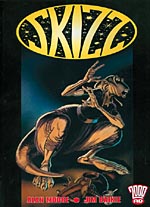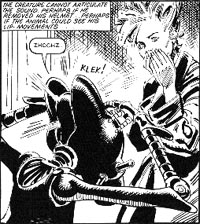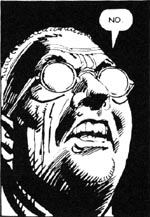>> The Friday Review: The Losers: Ante Up
>> The Friday Review: Marvels
More...

 Writer: Alan Moore
Writer: Alan Moore
Artist: Jim Baikie
Price: £9.99
Publisher: Titan Books
ISBN: 1840234504
I would have been all of five years old when I saw Steven Spielberg's ET: THE EXTRA-TERRESTRIAL. Back in the day before multiplexes popped up all over the landscape like some sort of architectural virus, an evening at the local drive-in was a big deal for a little 'un such as I was then. I remember laughing when ET was dolled up in Halloween costume, crying when he got sick (I was a sensitive child), and cheering when he 'phoned home'. I've seen it a few times since then, and I appreciate why it works, because the movie does what it says on the tin, so to speak: it makes the audience feel good.
Being older now, I can also appreciate the subtexts that I wouldn't have been able to grasp when I saw it, wide-eyed on the wide screen - mainly the oft-told 'stranger in a strange land' theme. As such, it's not that hard to grasp the reaction that Interpreter Zhcchz (pronounced 'Skizz') of the Tau-Ceti Imperium has when he crash-lands on our planet some fourteen miles outside of Birmingham, England. His first glimpse of the human race involves a group of drunken skinheads fighting outside a pub. Confronted with that, it's likely I'd go into shock, too.
SKIZZ, as realised by Alan Moore and Jim Baikie, does bear certain (and to be sure, deliberate) similarities to Spielberg's touchy-feely close encounter. Many of the plot beats resonate with a familiarity lent by its big-screen inspiration: the discovery by a sympathetic earthling (schoolgirl Roxanne O'Rourke); the exchange of ideas; Skizz falling ill; government intervention; rescue, recovery, pursuit, and eventual climax, replete with awe-inspiring alien craft. However, where Spielberg's story was essentially a fairy-tale for children (and children-at-heart), SKIZZ works as an exploration of cultural differences and tolerance thereof, with Skizz's presence bringing these points to the fore.
 Admittedly, SKIZZ is very much a product of its time and place: the early days of England under Thatcher. A time of high unemployment, of miners' strikes and white riots, of another music in a different kitchen - the dying strains of punk, dub and reggae infecting the mainstream (but let's not mention the new romantics, eh?). Far from being jarring, though, the cultural details serve to anchor the story, rather than pull focus from it. Indeed, when Roxanne is seen to be at school, pondering Skizz's fate, a fellow classmate remarks that, "She's bin walking about all day with a face like 'Ilda off Coronation Street". Asides like this provide context, leavening the tale and giving it a distinct flavour.
Admittedly, SKIZZ is very much a product of its time and place: the early days of England under Thatcher. A time of high unemployment, of miners' strikes and white riots, of another music in a different kitchen - the dying strains of punk, dub and reggae infecting the mainstream (but let's not mention the new romantics, eh?). Far from being jarring, though, the cultural details serve to anchor the story, rather than pull focus from it. Indeed, when Roxanne is seen to be at school, pondering Skizz's fate, a fellow classmate remarks that, "She's bin walking about all day with a face like 'Ilda off Coronation Street". Asides like this provide context, leavening the tale and giving it a distinct flavour.
Given that it is Alan Moore penning the tale, the potential reader shouldn't be surprised that it is somewhat removed from the usual 'alien crash-lands on Earth' scenario. The storytelling is assured and masterful, manipulating the reader into feeling for Skizz and Roxanne, identifying with out-of-work dossers Loz and Cornelius, and utterly despising government spook Van Owen. We perceive a true sense of the otherworldly in Skizz (via hints of his language, culture and customs), coupled with alienation - "You are the aliens!" he accuses his captors, and we believe him.
Roxanne is very much your typical confused schoolgirl, but she is also willing to stand up for herself if needs must; once Skizz happens upon Birmingham, it sets in motion a domino effect that leads Roxanne to be the driving force of the plot. Loz comes across as a prototype John Constantine, complete with disaffected air and flip street patter. Cornelius (as I'll shortly relate) provides equal amounts comedy relief, righteous anger and sense of wonder, while Van Owen - well, he's a one-note slimeball, but he represents 'the establishment' to a fault.
 Jim Baikie's thin, scratchy artwork does ample justice to the characters described above, and the surroundings they exist in. At moments, the artistic storytelling can be staid and cliché, but Baikie rises to the occasion when the story calls for it. The depiction of Skizz's technology (and by extension, that of his race) is one such example, while the moments involving Cornelius in full flight are among the story's highlights.
Jim Baikie's thin, scratchy artwork does ample justice to the characters described above, and the surroundings they exist in. At moments, the artistic storytelling can be staid and cliché, but Baikie rises to the occasion when the story calls for it. The depiction of Skizz's technology (and by extension, that of his race) is one such example, while the moments involving Cornelius in full flight are among the story's highlights.
Cornelius - who has his pride, his work skills, and little else - alternates between two emotional states: extreme rage and childlike passivity. While he is seen to be going back and forth, depending on the stimulus, he is in fact the emotional arc of the main players writ large: Skizz, Roxanne, Loz, and even Van Owen move from fear and mistrust to understanding (even if Van Owen's comprehension is negated by denial). Cornelius' responses to Skizz and his predicament is the true heart of the tale - when he realises that his lot in life is not that different to that of Skizz, the story truly comes alive.
The most telling scene is when Cornelius accompanies Roxanne to her parents' house; Roxanne is considered 'missing' (read: under interrogation by Van Owen), and has opted to inform her parents of the situation. When her father protests his incredulity at what Roxanne tells him, Cornelius demonstrates his frustration by throwing a chair through the O'Rourke's front window, dragging Mr. O'Rourke to said window, pointing out to the night sky and declaring, "There's nothing as important as that! Not even pipe-fitting!" Thus, the plea for tolerance is driven home.
As I stated earlier, that is what SKIZZ is about - that, and the need to dream, to look up every so often (as the whole of the town does at the story's conclusion). Whereas Moore's other significant 2000AD creation, HALO JONES, was concerned with 'going out', Skizz (like his Hollywood inspiration) merely wanted to go home, but ended up helping those whom he came into contact with to appreciate their situation for the better. I'm hopeful that once you read SKIZZ, you may do the same.

This article is Ideological Freeware. The author grants permission for its reproduction and redistribution by private individuals on condition that the author and source of the article are clearly shown, no charge is made, and the whole article is reproduced intact, including this notice.


